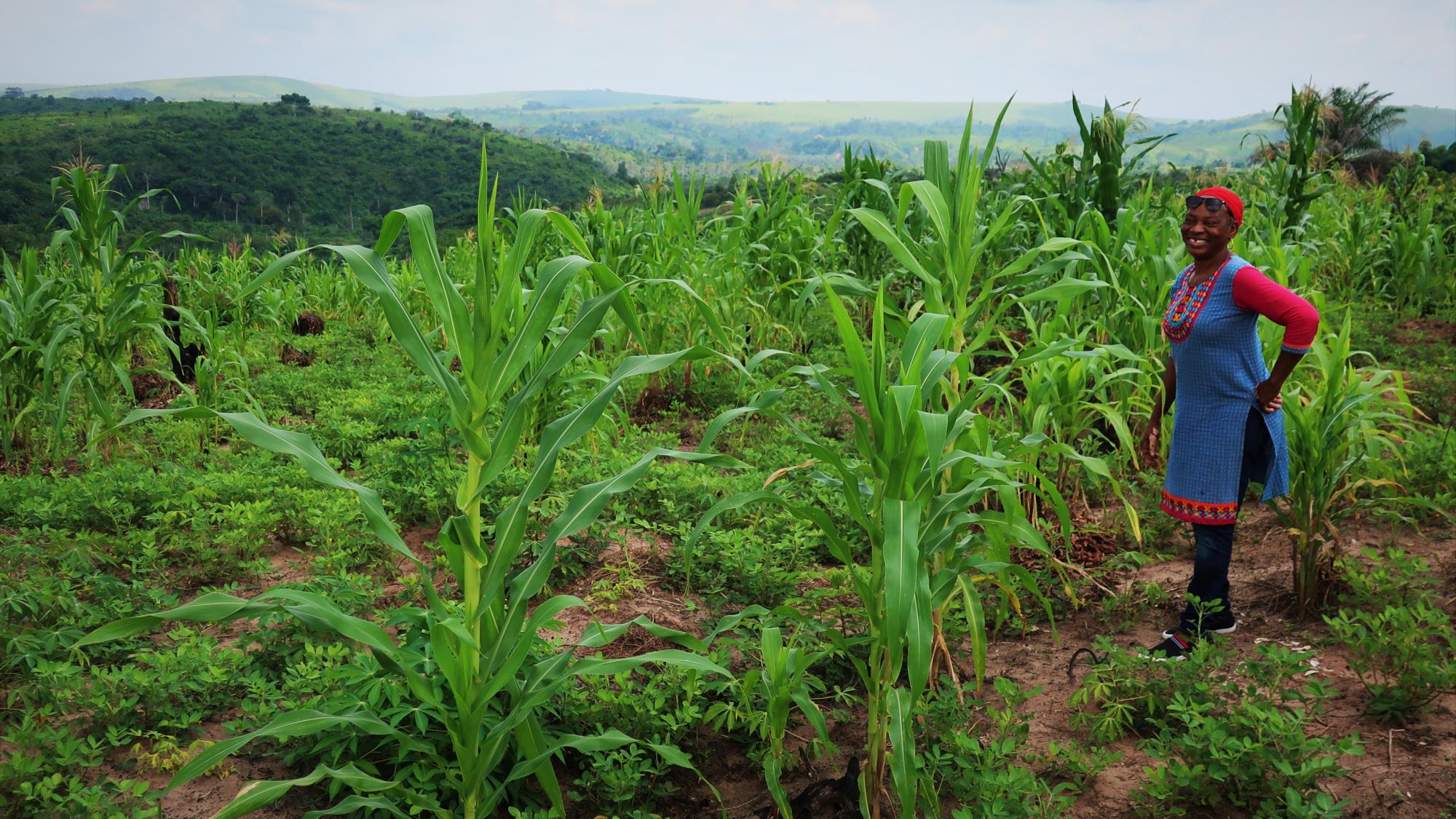At the beginning of this third millennium, humanity confronts serious ecological problems that threaten human life and all of creation. The consequences of global warming are perceptible in every country of the world: polluted air and water, serious flooding, extreme heat, etc.
In Africa, principally in sub-Saharan countries, populations are exposed to many diseases as a result of the deterioration of creation and conditions of life. Other parts of creation, both wild and domestic, such as fish and animals, birds, trees and rivers have not been spared. They are victims of human greed and foolishness. Yet, even as the Lord protects us, we must protect God’s creation by taking care of the earth and its inhabitants. This is the will of the creator.
The Bible and creation care
The Bible is not silent when it comes to the responsibility of human beings with regard to creation. It is so rich in lessons in this area that some have come to consider the Word of God as an ecological book, a manual that helps Christians live correctly on this earth, a manual that indicates “how to live on the earth in order not to be disoriented when arriving in heaven” (Dewitt).
Old Testament foundation
The Old Testament contains several passages that teach us about our responsibility toward creation. Nevertheless, the most eloquent passage is Genesis 2:15: “The Lord God took the man and put him in the garden of Eden to till it and keep it.” This verse lays the biblical foundation for the protection of creation. It underlines the cultural mandate of the mission of God entrusted to human beings in the garden of Eden. This dual missionary mandate consists of tilling it and keeping it.

Tilling it – àvàd
Etymologically, this word originates from the root word àvàd meaning till, serve, work. Throughout the Old Testament, àvàd has two meanings that come down to the same thing: honour and glorify God.
In the first case, it is a question of offering an act of worship to God, to accomplish certain services of adoration. Secondly, it relates to the manual labour of humans to meet their own needs or the needs of the master in the case of servants. It is also a service provided to kings (Exodus 20:9; 30:16; Leviticus 25:39; Deuteronomy 28:23; Psalm 128:2; 24:1–2; Acts 20:35; 1 Corinthians 16:58; 2 Thessalonians 3:8–9, 11).
From this perspective, the human person is not created to do nothing. Labour is a necessary part of human nature, something that develops intelligence, ingenuity and the forces of energy and will, as well as those of the body (Rochedieu). The human person is first called to work, because it is the condition sine qua non for all development. A human being continues the work of God through labour, because God wants the person to prosper. The apostle Paul even says “anyone unwilling to work should not eat” (2 Thessalonians 3:10).
One should underline that in the beginning, manual labour was neither a curse nor the consequence of sin. It is a divine institution. Labour comes from God, because God worked and continues to work.
The term àvàd, understood as a service to offer, brings us back to our responsibility to worship God. We know that true worship consists of putting oneself in the service of others for good (Isaiah 58:6–7; James 1:27); to till the soil means to obey the will of God. On this subject, Bible commentator Rochedieu says, “there is a close analogy between tilling, worship and culture. Putting the mission to good use results necessarily in service offered to God for God’s glory and honour and for the well-being and integrity of all creatures, asking God for bread while at the same time working to obtain it.”

Keeping it – shamar
This verb means to keep, survey, watch over, protect, conserve, hold onto, conserve the memory, observe, notice, hold. This verb is used 126 times in the Pentateuch, 128 times in the Prophets, and 165 times elsewhere in Scripture. In the Genesis 2:15 passage, shamar takes on the sense of survey, preserve, care for.
From this perspective, the task of human beings is to protect the garden from an enemy of a completely different nature who aspires to become its master and will appear without delay. This task given to Adam with regard to the garden foresees the task of humanity with regard to the earth.
The word shamar refers as much to shepherds watching over their flock as it does to the farmer who tends a garden as in Gen. 1:28 and 2:15. “Humanity was made responsible” (Roop).
“The mission entrusted to us by God is not accomplished in the exploitation and destruction of flora and fauna,” writes ethics professor Jochem Douma. “On the contrary, the business of humans is not just about manipulating and deforming things according to their pleasure in order to enrich themselves, but about administering a function determined by God. It follows that humans must behave with other members of creation taking into account the characteristics attributed to each by God.”
As administrators of great things, humans cannot presume to be owners. The world is God’s creation and not that of human beings. Humans are the managers of a creation that remains the property of God. Creation must be managed according to the norms of divine justice and not according to human desire for power.
In our time, creation has been damaged on such a large scale that it cannot leave those of us who call ourselves disciples of Jesus Christ indifferent, because the survival of humanity today and generations to come depends on us.
New Testament foundation
Several New Testament passages speak of the cosmic dimension of the gospel. We will limit ourselves to examining the texts in Paul’s epistles to the Colossians (1:15–23) and Romans (8:18–22).
Colossians 1:15–23 clearly affirms that in Christ, everything (panta in Greek) exists because “all things have been created through him and for him.” It describes the relationship that exists between the Christ of creation and the Christ of the cross. Christ is the one in whom all things are reconciled and rediscover harmony. Paul boldly declares that the beneficiaries of this rediscovered harmony are not just humans, but all things. This is an established principle for the present and the future.
In Romans 8:18–22, Paul writes that all of creation suffers (humans and other creatures), and all await the redemption of the children of God. This suffering comes from human rebellion against the law of God. For God created a luxuriant and productive garden without weeds, a place of complete health and life, but sin brought sickness, death, thorns and thistles. Humans must work hard to make a living because this nourishing earth is cursed. In the span of two centuries (since the beginning of the industrial age), the human species has called into question the basic foundations of life.

Creation is suffering and groaning in labour pains as a result of human activity: the destruction of natural spaces and urbanization, the extinction of species, the deterioration of the soil, the transformation of natural resources, waste and dangerous products, pollution on a grand scale, the alteration of the planet’s equilibrium, human and cultural deterioration, global warming, the lack of sanitation in the large cities of developing countries, etc. These are serious illnesses that creation is suffering from.
The mandate that God entrusted to human beings is to till and keep the garden. However, in reality, human beings are only exploiting the earth without paying attention to the second part of the cultural mandate to care for the gift of God, knowing that the true owner of the cosmos is God who created all things for God’s glory. If God granted us the good deeds of creation to enjoy, we must take care not to threaten its potential.
If we act according to biblical teaching on this subject, we will live happily and offer a radiant future to coming generations.
The benefits of following biblical teaching on creation care
Biblical teaching on creation care has several benefits. It allows us to:
- Banish ignorance in the face of our responsibility when it comes to protecting creation. The more we are informed on the damage and destruction inflicted on our Lord’s earth, the more we are obligated to revisit our responsibility as managers and administrators of our planet and its inhabitants. We understand that God is the creator of the entire universe (Genesis 1:1), which bears eloquent testimony to God (Psalm 19). All of creation belongs to God (Deuteronomy 10:14; Psalm 24:1; 1 Corinthians 10:26), who loves creation and takes care of it, giving water and nourishment to all creatures (Psalm 104; Acts 14:17), even as God gave Christ Jesus (John 3:16). We are assured that the Lord blesses and keeps us (Psalm 104; Numbers 6:24–26).
- Grant a sabbatical rest, i.e., time for reestablishment and the enjoyment of the fruits of God’s creation (Exodus 20:23; Leviticus 25:26). Even as God provides for the needs of God’s creatures, we must also do so by permitting the rest of creation to be productive and multiply (Genesis 1:22; 9:1–7; 28:17), and not add “house upon house” (Isaiah 5:8).
- Participate in efforts to stop the rapid deterioration of creation that threatens the world. The consequences of this deterioration are dramatic for the humans as well as other species.
- Work toward sustainable development without compromising the development of future generations.

The costs of creation care
On a planetary scale, world governments are divided on questions linked to the protection of the environment. Capitalist countries and the most industrialized countries of the world are the biggest polluters. They do not speak the same language on the question of global warming, which is a genuine threat to the future of the world. Last year (2017), the United States, one of the most industrialized countries of the world, pulled out of the Paris climate accords.
The most industrialized states must set aside their egos and change their vision of the world to make way for the hope of changing the face of the world. It is then that the financial means can be mobilized to stop the damage to creation and its global consequences. Each state must be conscious of the serious ecological problems that threaten the very existence of creation.
In the Democratic Republic of the Congo (DRC), the environmental situation is dramatic. Indeed, since the 1994 genocide in Rwanda, thousands of armed refugees have devastated the fauna and flora in the eastern part of the country. Successive wars in this region have contributed to the destruction of the environment. Virunga and Garamba national parks have become hideouts for local and foreign armed groups that kill mountain gorillas, okapis, hippopotamuses, etc.
In cities like Kinshasa, the environmental situation is tragic: Kinshasa, once called ‚ÄòKin la belle’ [Kinshasa the beautiful] is now described by the people of Kinshasa themselves as ‚ÄòKin la poubelle’ [Kinshasa the trash can] (Nzuzi). Unsanitary conditions reign everywhere. Plastic bottles are thrown out in gutters, streams and rivers. Erosion has washed away parts of certain neighbourhoods in the city.
This lack of sanitation is at the root of deadly diseases such as typhoid, malaria, cholera, etc. Even as I write, a cholera epidemic is raging in one of the most populated and disadvantaged areas of Kinshasa named Camp Luka.
Faced with this situation, both the federal government and the provincial government of Kinshasa are powerless. According to the governor of the city, the provincial government lacks the financial and material means to ensure daily clean up. Efforts agreed to by the government and people of good will are a drop in the ocean.
Protecting creation demands significant financial resources and a change in people’s mentality.

The contribution of Mennonite churches to the protection of creation in the Democratic Republic of the Congo
The damage done to creation in the DRC is closely tied to the cultures and food and economic needs of the populations of each province. For example, in the regions of Kasai and the southwestern part of Kwango, small scale diamond mining has completely modified the flora as well as water systems and certain species of animals have disappeared altogether.
In such an environment, Mennonite leaders raise the awareness of their members and local populations toward a change in mentality; to see creation in the light of biblical teaching.
Thanks to the Evangelism and Community Health program, pastors and even church members have been sensitized to work for their own development, but also for the protection of the environment and the struggle against unsanitary conditions. For example, we have asked all of the pastors in Kinshasa to clean up the immediate environment around their parishes, to install hygienic bathroom facilities and to plant trees in courtyards where space allows it. After visiting some of the different parishes, this work has already proven to be effective.
In addition, young Mennonites have joined with other young people to work against unsanitary conditions and erosion in Kinshasa. This work is being done with the means people have at their disposal: sacks, shovels, etc. Thanks to the efforts of our young people in past years, the Lonzo parishes in Camp Luka of Ngaliema district and the Mfila parish in the Delvaux neighbourhood of the same district were saved from erosion that threatened their very existence.

Conclusion
In the context of the DRC, Christian churches in general and Mennonite churches in particular bear a heavy responsibility with respect to the protection of creation. Christian leaders and the faithful in local churches need more teaching on the theme of creation care. They must also engage in concrete action that moves in the direction of protecting creation. Church leaders must play a prophetic role in calling out political leaders concerning the deterioration of the environment.
The context of our brothers and sisters of the North is different from that of the South. Nevertheless, the struggle against the deterioration of the environment is a shared one, because the consequences are not only local, but global. This is why the experience of those in the North can serve those in the South who are the most exposed to the harmful effects of the damage to God’s creation.
Historically, Mennonites are attached to working the earth (tilling and keeping it) and our varied experiences can reinforce the bonds of fellowship and sharing. My dream is that an MWC Development and Creation Care Commission could make a permanent mark as a community of faith attached to the teachings of Christ.
—Kukedila Ndunzi Muller is provincial representative of Communauté des Eglises de Frères Mennonites au Congo (CEFMC), the Mennonite Brethren church, in Kinshasa, teaches at the University Center of Missiology (Kinshasa), and is a doctoral candidate in holistic development.
This article first appeared in Courier/Correo/Courrier April 2018.
Bibliography
Dewitt, C.B., L’environnement et le chr√©tien (Quebec: Ed. la clairi√®re), 1995 .
Douma, Jochem, Bible et écologie (France: Kerygma), 1991.
Rochedieu, Charles, Les trésors de la Genèse (Geneve: Emmaüs).
Roop, Eugene F., Genesis, Believers Church Bible Commentary (Scottdale: Herald Press), 1987.
Nzuzi, F. Lelo, Kinshasa, Ville et Environnement (Paris: L’Harmattan), 2009.
Katalamu, Mobi, “Protection durable de l’environnement” (Kinshasa: CUM), 2016.
Harimenshi, P.B., Mission et écologie (Kinshasa: CUM), 2002.
Read also
Churches together for climate justice
